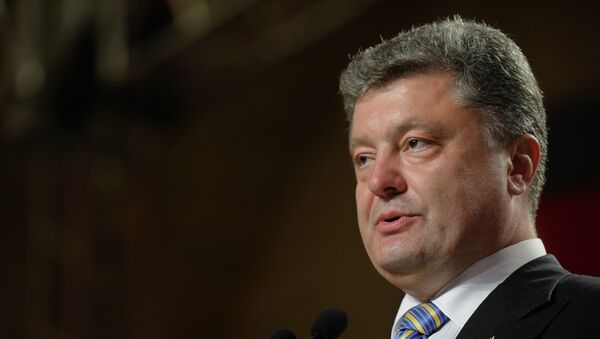WASHINGTON, October 28 (RIA Novosti) – Ukraine's President Petro Poroshenko has chosen a political settlement of the conflict in Eastern Ukraine over military confrontation, Deputy Director of the Kennan Institute William Pomeranz told RIA Novosti.
"I think Mr Poroshenko has made it clear that he at least has chosen political reform domestically as opposed to military confrontation. He has already swallowed, I think, the bitter political pill of having a ceasefire in Eastern Ukraine," Pomeranz said.
Pomeranz does not see the political settlement of the crisis in the nearest future and believes that Poroshenko will push reforms in the regions where he controls the situation and "will pursue negotiations and try to reincorporate the Eastern regions overtime".
The expert also claimed that the settlement of Ukrainian crisis depends on the Russian side as well.
"What looks like a frozen conflict remains in Eastern Ukraine," the Kennan Institute deputy director added.
He noted that Sunday's parliamentary elections in Ukraine indicate that Poroshenko will have to work with other political forces inside the country to implement his agenda and form a coalition government.
"I think the political composition of the new Rada is obviously very different from the previous one. I would not necessarily attach the word radical as of yet to the current Rada [Ukraine's parliament]. You will have some very lively opposition parties, both in terms of Ukrainian nationalists most likely, and in terms of populists, in terms of small strong opposition who wants closer ties with Russia," Pomeranz concluded.
Early parliamentary elections were held in Ukraine on Sunday. According to Ukraine's Central Election Commission, the turnout stood at 52.42 percent.
Currently, with some 55 percent of ballots counted, the People's Front has garnered 21.6 percent of the popular vote, and the country's current president Petro Poroshenko's Bloc is close behind with 21.45 percent, according to the Central Election Commission. The parties are now considering creating a coalition.
The two leading parties are followed by the Samopomich (Self-Help) party headed by mayor of Lviv Andriy Sadovy with 11.2 percent of the votes, the Opposition Bloc with 9.8 percent, Oleh Lyashko's nationalist Radical Party with 7.34 percent, and Batkivshchyna (Fatherland) party headed by former Prime Minister Yulia Tymoshenko with 5.65 percent.

